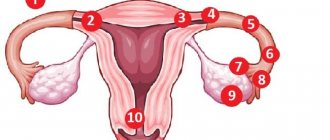Where to start planning a pregnancy after 35?
Planning a pregnancy after 35, although different from that at a younger age, still has some similarities. Typically, women know that the likelihood of conceiving, carrying a baby and having an easy pregnancy in adulthood is lower, so they treat the planning stage very responsibly and carefully.
It must be said that previously medicine was practically powerless, and pregnancy after 35 depended solely on the woman’s reproductive system. Today there are many ways to help women become mothers at almost any age.
When preparing for pregnancy on their own, future parents should, at a minimum, completely eliminate bad habits and review their diet. The possibility of successful conception is very low for partners who love fast food, fatty dishes and ignore vitamins.
If a woman plans to become a mother in her 40s, you should consult a doctor if pregnancy does not occur after 6 months of regular unprotected contact. In this case, you will need to undergo testing to ensure that neither the man nor the woman has to be diagnosed with infertility. It is not difficult to guess that such a request will serve as the basis for prescribing a number of diagnostic measures for both the expectant mother and the father.
From the moment of contacting a gynecologist until the verdict is rendered, 2-3 months usually pass: this is exactly the time it will take for the following studies:
- Analysis of the male reproductive system: assessment of sperm quality, sperm viability and activity, number of sperm per 1 ml of seminal fluid and other indicators. In addition, a man may be prescribed other tests that can directly or indirectly affect the possibility of becoming a father.
- Analysis of the female reproductive system, including assessment of the quality of eggs, regularity of the menstrual cycle and other indicators of the condition of the reproductive and other systems.
After this, a conclusion is made whether a man and a woman can become parents naturally, a course of treatment is prescribed (if necessary), and the gynecologist gives some recommendations.
Additional recommendations
- Give preference to loose underwear.
- Avoid saunas and hot baths.
- Reduce physical activity for athletes.
- The frequency of sexual intercourse is every 36 hours, no less.
- Avoid lubricant.
- Calculate your ovulation period and have sex during this period.
It is undoubtedly worth taking care of supporting the reproductive system, on the health of which successful conception depends.
"Ovariamin" naturally normalizes the physiological functions of the ovaries. This natural regulator promotes pregnancy and the birth of a healthy child. Be reasonable, approach the issue responsibly and let your home be filled with children's laughter! Share:
What tests should you undergo if this is your first pregnancy:
Regardless of a woman’s age, the first pregnancy is always an important and responsible event that requires special preparation.
— consultation with a gynecologist
Of course, from the pregnancy planning stage to childbirth (or even longer), a woman most often visits a gynecologist. At the first visit, it is important for the doctor to assess the condition of the reproductive woman from her own words, so first of all, the gynecologist will ask a number of questions:
- What contraceptives did the woman use during her life (barrier, oral, etc.), if pills, then which ones and when did she stop taking them?
- Does she have any chronic diseases;
- Have you ever been treated with antibiotics or hormonal drugs;
- Have there been (or are there) any diseases of the genital area in the anamnesis, including sexually transmitted diseases;
- Are there any cases of hereditary pathologies in the family?
The survey necessarily ends with an examination in a gynecological chair. As a result of the examination, the doctor determines the condition of the woman’s reproductive organs, including:
- Condition of the cervix (analysis for the presence of erosions, neoplasms);
- Condition of the ovaries (examination by palpation).
The doctor also removes the intrauterine device, if it is installed.
After this, the gynecologist sends the woman for tests (urine, blood), ultrasound, and also recommends visiting a geneticist, therapist, and endocrinologist. Both potential parents must visit the geneticist.
- therapist
Visiting a therapist is the next step in pregnancy planning. Not only women, but also men visit him to identify possible diseases in various areas.
The general practitioner conducts a survey, may prescribe additional tests (for example, an ECG), and also recommends several vaccinations, which it is advisable to give the woman shortly before pregnancy in order to avoid infection during pregnancy. Since a woman’s body weakens greatly when carrying a baby, it is better to play it safe and get a series of vaccinations that will protect both her and the fetus from the negative effects of infections.
The therapist gives recommendations regarding the permissibility of taking certain medications, and if treatment of a disease with antibiotics or other drugs incompatible with pregnancy is required, he stipulates the timing of the ban on conception. Only after the body is ready for pregnancy will the doctor allow you to have unprotected sex.
Finally, the therapist can give a referral to specialized specialists, for example, a gastroenterologist, cardiologist, dentist, otolaryngologist and others.
- endocrinologist
The state of the endocrine system directly affects reproductive health and the ability to become a mother. Excessive or insufficient synthesis of any hormone (especially the pituitary, thyroid and adrenal glands) can prevent conception.
Regardless of the presence or absence of symptoms that may indicate problems with the endocrine system, a woman is recommended to visit an endocrinologist. You will need to undergo an examination if you are underweight or overweight, if you suspect diabetes mellitus, or if you have problems with the thyroid gland.
More on the topic
Pregnancy after a frozen pregnancy
Pregnancy after cesarean section: when can you try and what to consider?
What tests need to be taken after a frozen pregnancy?
Pregnancy after an ectopic pregnancy
Pregnancy after 40 years
- geneticist
All couples are recommended to visit a genetic specialist at the planning stage, especially if they are over 35 years of age. A geneticist identifies the likelihood of hereditary pathologies, helps reduce it, and warns about possible risks.
The geneticist especially carefully studies patients who:
- There were people in the family with genetic diseases such as Down syndrome, Alzheimer's disease, schizophrenia and other mental disorders;
- Diseases such as thrombophlebitis, chronic diseases of the cardiovascular system have been transmitted among relatives, or there is a risk of transmission from potential parents;
- There were cases of hemophilia in the family.
Sometimes additional testing is required to identify chromosomal mutations.
With or without indications
The list of specialists you need to contact when planning a pregnancy is individual; The therapist and gynecologist will tell you where to start.
Most often, visits to the following specialists are prescribed:
- Dentist. All dental problems must be resolved before conception, eliminating the possibility of infections and the onset of inflammatory processes during gestation. Sanitation of the oral cavity in preparation for pregnancy is included in the mandatory list.
- Otolaryngologist. Even if there are no chronic diseases of the nose, ears or throat, it is worth visiting an ENT doctor to rule out infection of the mucous membranes.
The examination and preparation for pregnancy routine includes an examination by an ophthalmologist.
The therapist can refer a woman to other specialized specialists based on test results or after studying the outpatient card of the expectant mother:
- if there are problems with the kidneys and urinary tract - see a nephrologist and urologist;
- if you are diagnosed with an allergy, consult an allergist and dermatologist;
- for diseases of a neurological nature, including migraines, see a neurologist.
Sometimes the patient requires consultation with an immunologist, endocrinologist, cardiologist and surgeon.
What examinations need to be done if this is a repeat pregnancy?
If a woman already has a history of pregnancy that ended in childbirth (not a miscarriage, not an abortion), planning, although slightly, is simplified, and there are much fewer reasons for concern, especially if the pregnancy was easy.
An examination by a gynecologist is of key importance: a survey (how previous children grew and developed), a gynecological examination to assess the condition of the genital organs, determine pathologies of the uterus and vagina. It is also very important whether a cesarean section was performed during the first birth and for what indications.
The gynecologist will definitely find out if there is a history of abortions, miscarriages, stillbirths or missed abortions. After consulting a gynecologist, potential parents undergo the same examinations as couples when planning their first pregnancy.
It is also necessary for the expectant father to undergo examination, especially if the first child was not born from him.
Disadvantages of pregnancy after 35 years
Many people know that pregnancy after 35 years is always accompanied by risks, but the question is “which ones exactly?” takes you by surprise. Why is it harder to become a mother at this age?
Firstly, the risk of having a child with genetic abnormalities and chromosomal mutations increases. The likelihood of having a baby with Down syndrome increases several times: for example, the frequency of this pathology in children born to mothers under 25 years of age is only 1 case in 1,250 healthy people, and after 35 years - 1 case in 400.
Secondly, the likelihood of spontaneous abortion is very high, especially in the first trimester. Approximately 20% of pregnancies at age 35 or later end in miscarriage.
Thirdly, a woman’s health after pregnancy at a dangerous age often deteriorates. Hypertension, diabetes and other diseases often develop.
Fourthly, pregnancy itself is often complicated. Often, when a woman over 35 is carrying a baby, placenta previa is discovered, which leads to bleeding during childbirth, and less often, to the death of the woman in labor.
Fifthly, with age, the likelihood of premature birth increases (before the 37th week), as a result of which a baby is born with a critically low weight.
All these unpleasant consequences can be avoided if you consult a doctor in time and carefully plan your pregnancy without rushing.
Our failures
Well, I’ll start from the beginning - divorce, second marriage, trying to have a child and failures... Two years of infertility, we both are fully examined, and the doctor’s verdict is that everything is not very good with my husband, of course, we are both being treated, a lot of pills and dietary supplements. Finally, we are being accepted for IVF, and immediately before this procedure we need to do another ultrasound, of course, think about the problems.
I’m worried - and then they say: “You have gastrosalpings, it should be removed before IVF, there is a risk of miscarriage,” etc. My God, how painful it is to postpone the day of conception, but nothing can be done - they say it must be done. In the meantime, there is no Moscow registration yet, and all the ensuing consequences - the search for a doctor and a hospital where it would be quick and inexpensive, and also preferably, of course, of high quality... And now a miracle - the doctor has been found, to hell with them, money, quickly I did it, I want to get pregnant. They do a laparoscopy, the doctor after the operation on rounds casually says: “We also flushed out your pipes there, so there’s no point in climbing.”
Great, we blew it and blew it. A month passes after the operation, the second, I can’t wait to get my period so I can go for IVF, but it’s still not there, well, you never know, the cycle goes wrong, and then it hurts - what if... The test shows two lines - I don’t believe it, and about twenty more tests and also two. We are crazy with joy, I go to the medical center, I go into the office, it’s the end of the day, the doctor looks tired: “Well, what are we doing today, Sveta?” And in response: “And today we thank you!” A surprised look, and then a sea of joy - my doctor jumped up and began to hug me with tears in her eyes: for them, every pregnancy is a holiday. I thought that the most important thing was to be able to get pregnant, and then somehow I would carry it to term.
We save, the contract with the 10th maternity hospital, everything seems to have been thought out, ultrasound at 14 weeks, a happy father is sitting next to us, our little happiness is on the screen, the doctor says: “You’re having a boy,” to which my husband then said: “We could have.” don’t say, I saw it myself.” No pathologies, nothing like that, everything is fine. 16-17 weeks, in the evening it started to lubricate, we go to the clinic - they put it in, and meanwhile on Christmas Day and in the maternity hospital there is no ultrasound doctor, there will be only tomorrow.
I spent the whole night on magnesium, the cramping pains do not stop, my doctor is just delivering a baby and is also doing nothing, only injected her with a no-shpa. Nobody said anything, but the result of the ultrasound the next morning was that the child died, the heart was not beating. I won’t describe everything - how labor was induced, how kelp was placed in the cervix, how, and especially under what conditions, I gave birth to my dead son...
Gloom and darkness, the desire to die... The thought of my daughter, how she is without me, keeps me going. I’m a bad mother, I didn’t save, I didn’t, I couldn’t... My husband is 36, I’m 34. This was his first opportunity to have a child, I’ll leave and give him the opportunity to have children with someone else, but he says that he only needs me. He supported me like no one else.
We get up and try again, the Lord seems to see all our suffering and gives us another pregnancy - this one was interrupted at 12-13 weeks, a girl. Nobody knows why this happens. A bunch of tests - and zero, zero, nothing.
How to increase your chances of conceiving a child after 35?
Of course, you shouldn’t give up on yourself at 35 years old if you really want to become a mother. To prevent the pregnancy planning stage from dragging on for several years, you can take care of your health in advance. To do this, you need to follow a number of simple but very important precautions:
- Stop smoking and drinking alcohol. There are often cases when mature couples managed to conceive a child after many months of unsuccessful attempts, giving up tobacco and alcohol for 3-6 months. This warning significantly improves the quality of germ cells, cardiovascular and other systems.
- Adjust your diet. The body of future parents should receive all the necessary vitamins, minerals and nutrients, but fatty, spicy foods, fast food and processed foods will only lead to problems with blood vessels and the digestive tract.
- Maintain an active lifestyle. A woman who devotes enough time to sports, even just walking in the fresh air, not only has a greater chance of getting pregnant, but also feels much easier while carrying a baby.
- Maintain a healthy family environment. Very often, a woman’s psychological state prevents her from becoming a mother. Excessive fears, uncertainty that she will be a good mother or her husband will be a good father, fear of losing attractiveness and other problems force the woman herself to prevent conception. This often happens if the relationship between spouses is rather cold, there is parental pressure, or one of the spouses insists on having a child in order to save the family. The chances of conceiving and bearing a child after 35 years increase if partners live in love, understanding and want to become parents.
Finally, the most important rule is to consult a doctor if necessary. Even mild discomfort, pain, or concerns should be a reason to visit a gynecologist without waiting until the scheduled examination. In addition, self-medication, the use of vitamin complexes on the advice of girlfriends or online forums, and non-compliance with doctor’s recommendations are strictly prohibited.
A woman should become a mother only when she is ready for this both morally and physically. This often happens in adulthood - after 30-35 years. The numbers in the passport are not a contraindication to conceiving a child, but potential parents should understand that they face a long and difficult period of preparation for it. Under no circumstances should you plan a pregnancy without visiting a doctor. Firstly, spouses can lose precious weeks, months and even years, and secondly, if they are not screened for certain diseases, there is a chance that the situation will worsen. Therefore, planning for a child at any age should begin with a visit to the doctor.
Especially for beremennost.net – Elena Kichak











